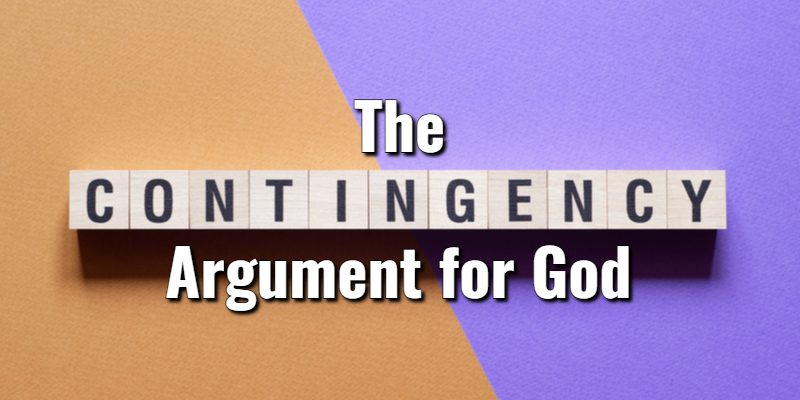Why is there something rather than nothing? Eighteenth-century philosopher and mathematician Goddfried Leibniz believed this is the main question we should ask. That question led Leibniz to articulate a version of what philosophers call the Contingency Argument for God’s existence. It falls within a category of other cosmological arguments for God’s existence, including the Kalam Cosmological Argument. Unlike the Kalam, though, the Contingency Argument is purely philosophical. Its premises do not depend on scientific proofs (science may come into play when rebutting common objections, though). The argument distinguishes between “necessary” and “contingent” things. “Necessary” things need no explanation; they exist by a necessity of their own being and nature. Platonists put numbers and propositions into that category. God, of course, is in that category. Everything else is “contingent,” meaning that it could have ceased to exist or existed in a different form. The Contingency Argument proves that God is the “necessary” being. Because numbers and propositions have no agency to create, God is the only necessary being that could have created all “contingent” things.Necessary and Contingent Things
Contingency Argument for God Presented
Several variations of this argument exist. This is the version presented by Christian philosopher/theologian William Lane Craig (verbatim from his website Reasonable Faith):
- Everything that exists has an explanation of its existence (either in the necessity of its own nature or in an external cause).
- If the universe has an explanation for its existence, that explanation is God.
- The universe exists.
- The universe has an explanation for its existence.
- Therefore, the explanation of the universe’s existence is God.
The Contingency Argument for God is powerful because its premises are so apparent and they proceed from common experience. Premise one, for instance, is based on the philosophical Principle of Sufficient Reason (PSR). Craig illustrates PSR (and the first premise) like this:
Suppose two people are walking in the woods and come upon a translucent ball. Obviously, they would assume an explanation for that ball. The need for an explanation wouldn’t change if the ball were the size of a car — or the size of a house or the size of a planet; or even the size of the universe.
That things don’t just pop into existence is common sense, which is why that premise cannot be logically or realistically refuted.
Contingency Argument for God: Web Resources to Consider
Despite the common sense appeal of some of the premises, other parts of the Contingency argument can be mind-bendingly complex. Lord’s Library has compiled a few resources to help you understand it:
Leibniz’s Argument from Contingency by drcraigvideos
Like many apologetic resources, some of the best start with Dr. William Lane Craig. This five-minute animated video is an accessible resource for complete beginners to the argument. With this overview from premises to conclusion, budding apologists are ready for more in-depth study.
Defenders Series: Argument from Contingency
In this three-part series, Dr. Craig teaches a class of students the premises of the Contingency argument and explains objections. During each hour-long session, Dr. Craig lectures and takes questions from the class. This series is useful for those who want deeper coverage of the argument.
The Cosmological Argument from Inspiring Philosophy
During this 12-minute video, Michael Jones, founder of Inspiring Philosophy, explains the contingency argument. His premises are worded a little differently from Craig’s. Jones has a way of anticipating confusion and addressing it within the presentation. Like so many of the resources from Inspiring Philosophy, this one, though short, is clear and comprehensive.
Alex O’Connor vs Cameron Bertuzzi: Why is there something rather than nothing? on Unbelievable
Atheist Alex O’Conner (aka, the Cosmic Skeptic) debates the Contingency Argument with Cameron Bertuzzi, apologist and founder of Capturing Christianity. Bertuzzi finds the Contingency Argument the most compelling of the arguments for God’s existence. Unsurprisingly, O’Connor does not. This debate will prepare listeners for possible objections to some of the premises.
Capturing Christianity: An Updated Contingency Argument
If the Unbelievable debate has you intrigued by Cameron Bertuzzi, you’ll be interested in this resource. Bertuzzi will be the first one to tell you he is not a philosopher nor a theologian. But he is a Christian with a passion for apologetics. His popular YouTube channel aims to expose viewers to “the intellectual side of Christian belief.” Bertuzzi’s version of the Contingency Argument is closely based on the work of Joshua Rasmussen, Assoc. Prof. of Philosophy at Azusa Pacific University. This page of his website is enlightening and especially helpful for those who prefer reading complex arguments in addition to hearing them.
In Genesis 1:1, the Bible says “In the beginning God created the heaven and the earth.” God is the “necessary” being without which no other beings would exist. Scripture revealed that powerful truth far before the Contingency Argument for God presented it philosophically. But non-theists may not be willing to hear anything from the Bible, so as Paul did, witnesses for the Truth may need to give them the “milk” of such arguments before they are ready for the “meat.”
See 1 Corinthians 3:2: “I have fed you with milk, and not with meat: for hitherto ye were not able to bear it, neither yet now are ye able.”
NOW READ: The Kalam Cosmological Argument: Web Resources to Consider
Lord's Library participates in affiliate programs. We may make a small commission from products purchased through this resource.
- Intelligent Design vs. Evolution: Six Web Resources to Consider - October 3, 2023
- Microevolution vs. Macroevolution: Six Web Resources to Consider - September 9, 2023
- Atheist Objection to Theism #4: Presumption of Atheism Argument - August 21, 2023













